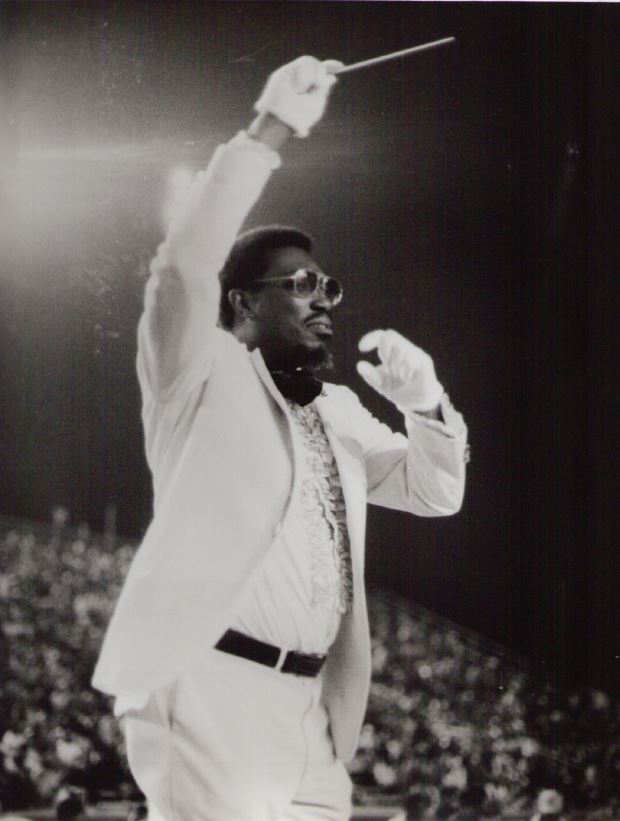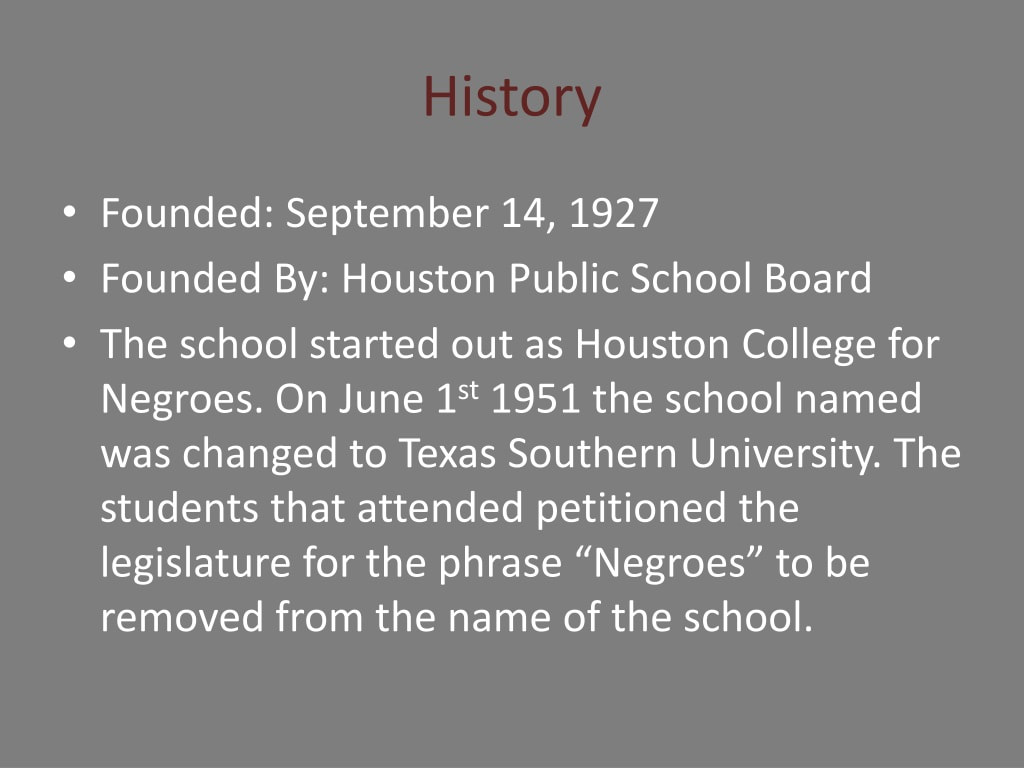The band at Texas Southern University was organized at Houston College for Negroes during the school year of 1945 - 1946. At this time, the veterans were returning from World War II. Many were also enrolling into this new school of higher education. Mr. Allen E. Norton, acting Dean at that time, requested a list of at least twenty-five (25) names so that a college band could be added to the extracurricular activities. Upon this request, thirty - five (35) interested musicians organized the first band of this institution. Conrad Johnson was contacted to serve as the Band Director. Our major performance was for the Spring Commencement Services of which I was a member of this class. Due to a lack of proper equipment and instruments, I was asked by the Band Director of accompany the band on the Precessional, “The War March of the Priest”. Because of our interest shown at this affair, we received a hearty welcome. The following September, we marched from what is now Ryan Junior High School to the newly built Fairchild Building. Also, Houston College for Negroes had acquired a new name, Texas State University for Negroes. More veterans and other students had enrolled and as a result, the band grew.
We have found out that at least three new directors have served during this period. They were James Hill Lark, Jr. (director when the Kappa Kappa Psi Chapter was received), Jack C. Bradley (later head of the Music Department of Texas Southern University), and Campbell A. Talbert (presently on the faculty of the Music Department in 1972). Efforts are still being made to find out additional information about this period of band history. We plan to get on record, a complete band history and the rest of this section will be added at a later date, if possible.
By the following season, 1968, we had been awarded new uniforms to encourage continual participation in the band. They were a tremendous improvement over the uniforms of yesterday. However, our hats resembled those worn by Milkmen with an added gray “feather” worn on top. We carried one memory from the past, however, white socks and white shoes. Added to our new dress code were white gloves. These new uniforms gave us an incentive to keep trying, in spite of public harassment and ridicule. We were determined that we wouldn’t be embarrassed any more. Because of our rebellion, we weren’t allowed to march at the first few games. Finally, our drum major, Kenneth Malveaux, and our staff of officers decided to chart our own half time show. At that time, John Roberts and Harold Aytche, of Shreveport, were assigned to David Peters as graduate assistants. Mr. Roberts, being a very devoted leader, tried everything in his power to help us. He helped us by creating marching drills downfield, arranging music, and giving us hints for a dance routine. The drum major showed us how we were to leave the field on drum rolls, breaking into a well known tune, arranged by Edward Lee Rose, a tuba player. We were somewhat satisfied.
This show was a strong improvement over the others in the past. At last, we were anxious to perform at half time for once. Our moment finally came, Astrodome, Grambling vs Texas Southern University. After we marched on the field, Ralph Yarborough was called onto the field to give a “thank you” speech. He had prepared the longest “thank you” speech in quite a while, it lasted the entire time of our show. After the speech, the band was ordered off the field by someone over the public address system. Grambling’s football team had already begun warming up for the second half, in spite of us standing on the field. Again, a voice ordered us off the field. Downtrodden and angry, we walked off the field. The audience laughed, threw paper at us and other things. Finally, the last game of the season came, TSU vs PV. This time, we performed our “well rehearsed” show. We hit the jackpot, at last. Instead of the audience’s boos and nays, we heard their cheering and screaming. Our pride, for once, had come through.
At the close of the Spring 1969 Concert Season, we heard rumors of a new band director for the Fall Season. Based upon the facts of the rumors, the man was a black man. Of course, experience had taught us not to build our hopes too high. Previous years, the same rumor raged throughout our ears and each time David Peters would return with his “Everythings Coming Up Roses”. To our great surprise, this was no longer a rumor, but the divine truth. July 1969, we were proudly introduced to our “Black Moses” in our time of trouble, Mr. Benjamin J. Butler, II and the birth of the “Ocean of Soul”. From that day to eternity, “Mr. Soul” will always have a special place in my heart and memory for his musical inspirations.
Since the name “Ocean of Soul” was given to the Texas Southern University Band by a local radio show, talking about a mountain of soul for Houston, it has commanded the interest and attention of the public locally and nationally. The flashy, pace setting, “Ocean of Soul” have appeared at numerous professional football games At the 1973 Battle of the Bands, the “Ocean of Soul” revealed to the public, for the first time, its new band uniforms. These uniforms were designed and represented the first class band, the “Ocean of Soul” band uniform is completely different from anyone else’s .
We have found out that at least three new directors have served during this period. They were James Hill Lark, Jr. (director when the Kappa Kappa Psi Chapter was received), Jack C. Bradley (later head of the Music Department of Texas Southern University), and Campbell A. Talbert (presently on the faculty of the Music Department in 1972). Efforts are still being made to find out additional information about this period of band history. We plan to get on record, a complete band history and the rest of this section will be added at a later date, if possible.
By the following season, 1968, we had been awarded new uniforms to encourage continual participation in the band. They were a tremendous improvement over the uniforms of yesterday. However, our hats resembled those worn by Milkmen with an added gray “feather” worn on top. We carried one memory from the past, however, white socks and white shoes. Added to our new dress code were white gloves. These new uniforms gave us an incentive to keep trying, in spite of public harassment and ridicule. We were determined that we wouldn’t be embarrassed any more. Because of our rebellion, we weren’t allowed to march at the first few games. Finally, our drum major, Kenneth Malveaux, and our staff of officers decided to chart our own half time show. At that time, John Roberts and Harold Aytche, of Shreveport, were assigned to David Peters as graduate assistants. Mr. Roberts, being a very devoted leader, tried everything in his power to help us. He helped us by creating marching drills downfield, arranging music, and giving us hints for a dance routine. The drum major showed us how we were to leave the field on drum rolls, breaking into a well known tune, arranged by Edward Lee Rose, a tuba player. We were somewhat satisfied.
This show was a strong improvement over the others in the past. At last, we were anxious to perform at half time for once. Our moment finally came, Astrodome, Grambling vs Texas Southern University. After we marched on the field, Ralph Yarborough was called onto the field to give a “thank you” speech. He had prepared the longest “thank you” speech in quite a while, it lasted the entire time of our show. After the speech, the band was ordered off the field by someone over the public address system. Grambling’s football team had already begun warming up for the second half, in spite of us standing on the field. Again, a voice ordered us off the field. Downtrodden and angry, we walked off the field. The audience laughed, threw paper at us and other things. Finally, the last game of the season came, TSU vs PV. This time, we performed our “well rehearsed” show. We hit the jackpot, at last. Instead of the audience’s boos and nays, we heard their cheering and screaming. Our pride, for once, had come through.
At the close of the Spring 1969 Concert Season, we heard rumors of a new band director for the Fall Season. Based upon the facts of the rumors, the man was a black man. Of course, experience had taught us not to build our hopes too high. Previous years, the same rumor raged throughout our ears and each time David Peters would return with his “Everythings Coming Up Roses”. To our great surprise, this was no longer a rumor, but the divine truth. July 1969, we were proudly introduced to our “Black Moses” in our time of trouble, Mr. Benjamin J. Butler, II and the birth of the “Ocean of Soul”. From that day to eternity, “Mr. Soul” will always have a special place in my heart and memory for his musical inspirations.
Since the name “Ocean of Soul” was given to the Texas Southern University Band by a local radio show, talking about a mountain of soul for Houston, it has commanded the interest and attention of the public locally and nationally. The flashy, pace setting, “Ocean of Soul” have appeared at numerous professional football games At the 1973 Battle of the Bands, the “Ocean of Soul” revealed to the public, for the first time, its new band uniforms. These uniforms were designed and represented the first class band, the “Ocean of Soul” band uniform is completely different from anyone else’s .


